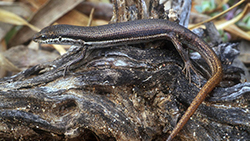* CSU-led research team finds some native lizards are not as naïve as previously thought
* Team has found two lizards that avoid the scents of foxes and feral cats as they would native predators
* This improves hope that some native species can better avoid and survive the impact of destructive predators
A research team led by Charles Sturt University (CSU) has reported in the prestigious journal Royal Society Open Science that some Australian native animals are not as ‘naive’ about nasty foreign predators such as foxes and feral cats as previously thought.
 Team leader Associate Professor Dale Nimmo (pictured left) with the CSU Institute for Land, Water and Society believes some native animals may have evolved a general system to evade all predators, both native and introduced, contrary to findings from previous studies.
Team leader Associate Professor Dale Nimmo (pictured left) with the CSU Institute for Land, Water and Society believes some native animals may have evolved a general system to evade all predators, both native and introduced, contrary to findings from previous studies.
“While we don’t know if they learn how to avoid predators or if it is a behaviour inherited through their genes, we do know that they recognise the scents of foxes and feral cats as a threat, and respond in a way that would reduce their chances of being preyed on,” Professor Nimmo said.
“This is contrary to the common belief that native species in general are ‘naïve’ to the scents of invasive predators. That is, they don’t recognise them as a threat.
“This gives some hope for some native species as we seek to predict or prevent the impacts of invasive predators on Australian wildlife.”
 The team’s findings are based on research into the reactions of two native Australian reptiles (Morethia boulengeri, pictured left, and Christimus marmoratus) to chemical cues from the red fox and feral cat, as well as three native predators – the spotted-tail quoll, the dingo and the eastern brown snake.
The team’s findings are based on research into the reactions of two native Australian reptiles (Morethia boulengeri, pictured left, and Christimus marmoratus) to chemical cues from the red fox and feral cat, as well as three native predators – the spotted-tail quoll, the dingo and the eastern brown snake.
Results showed that exposing the reptiles to the scents of all native and introduced predators reduced the reptiles’ food consumption, which showed that both reptiles spent more time ‘avoiding predators’ than eating.





Social
Explore the world of social